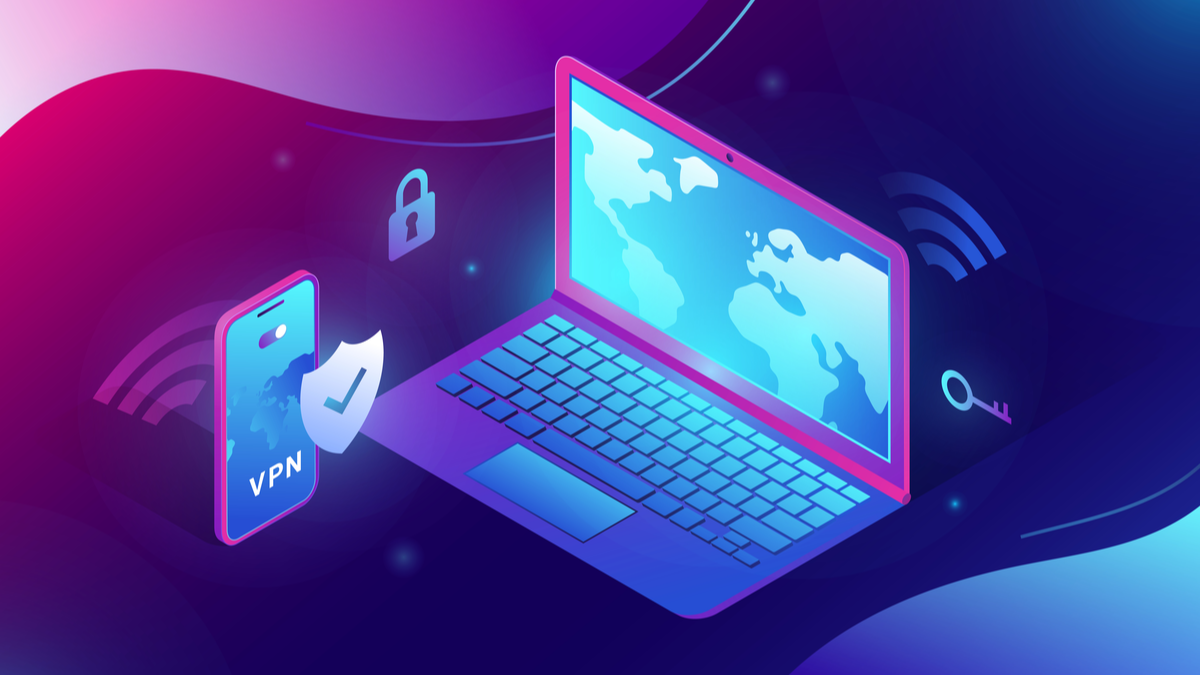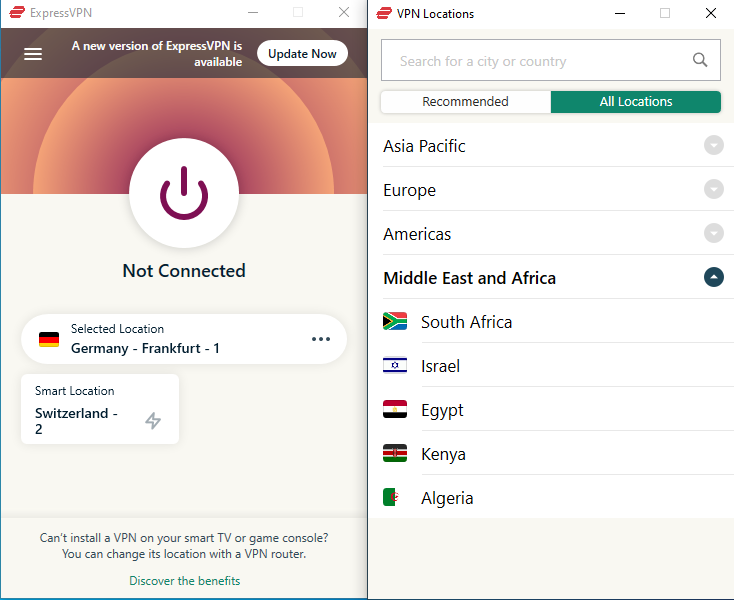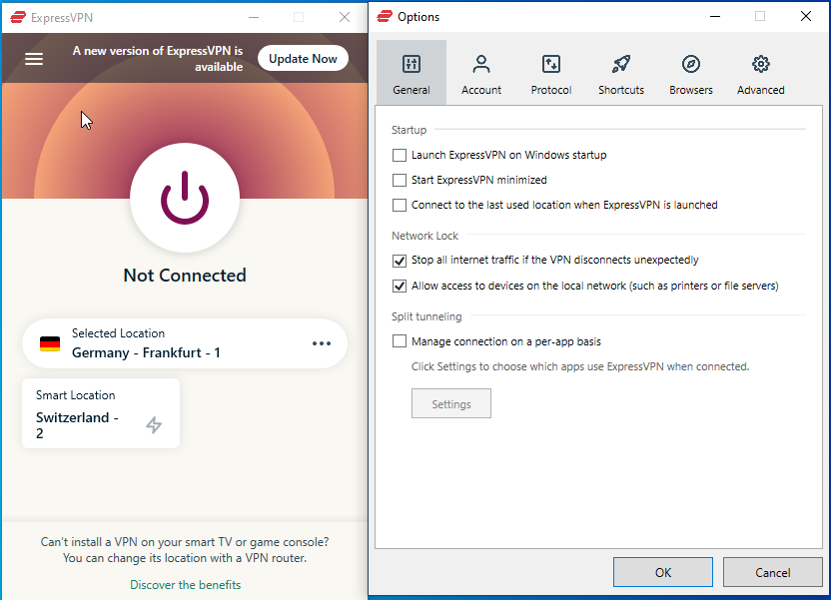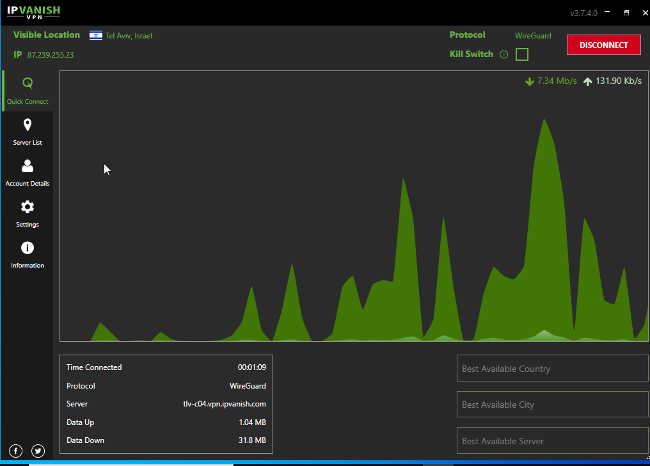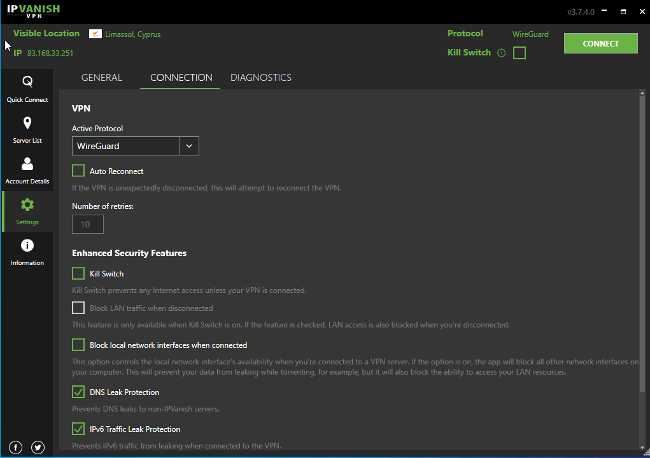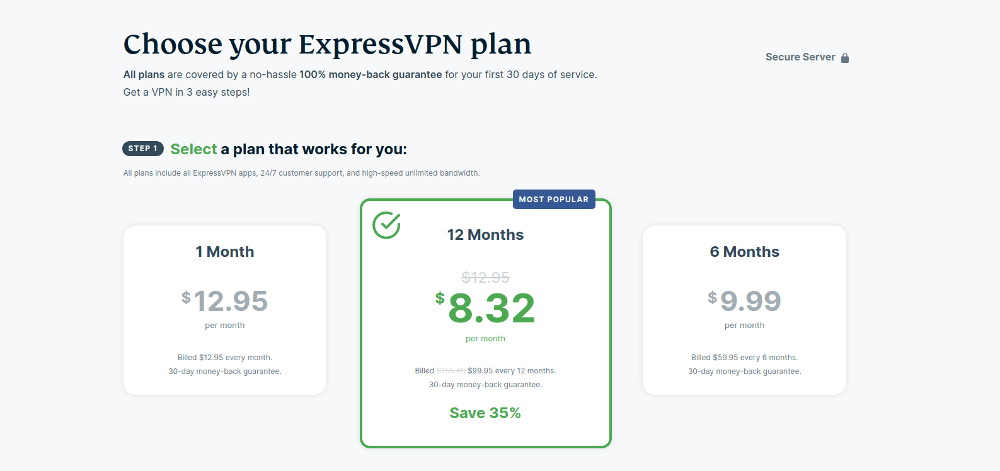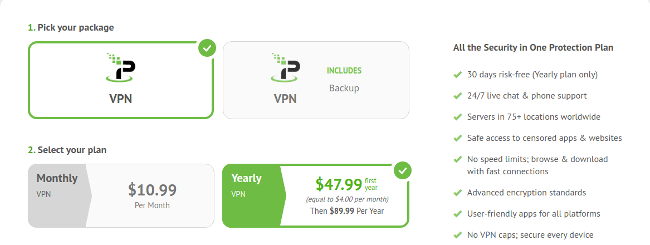IPVanish and ExpressVPN are two of the biggest names in the VPN industry. ExpressVPN is one of the best VPNs out there, while IPVanish went from being one of the most well-known names to a smaller player. Let's compare the two and see which one comes out on top.
Privacy
Let's first address the elephant in the room: The question of how private ExpressVPN and IPVanish really are. There's a lot of speculation surrounding both that may make either of them seem a less-than-ideal choice.
ExpressVPN
The questions surrounding ExpressVPN are the most recent. In September 2021, ExpressVPN announced that it was being taken over by Kape Technologies for close to $1 billion. That's good news for ExpressVPN, of course, but commentators were quick to point out that Kape is a company with a shady past.
For one, the company initially made its money through ad injection, which is a questionable technique by which your browser is tricked into displaying certain ads. Though this method isn't around much anymore, it was huge just 15 or so years ago and was definitely a bit of a sleazy way to make money, despite being legal.
On top of that, there is also some talk of ExpressVPN's entanglement with intelligence agencies. The people behind Kape are former Israeli operatives, and one of ExpressVPN's executives has ties to Project Raven. Raven was a surveillance program set up by the United Arab Emirates and staffed mainly by former U.S. spooks.
When Reuters blew the lid off Raven, it was big news, as it turned out that the team had spied on people from all over the world, including U.S. citizens as well as human rights activists. Having somebody who worked for Raven working at a privacy company was a bad look for the company, although ExpressVPN claimed it was a good thing.
IPVanish
That's a lot of strikes against ExpressVPN, but IPVanish also has some issues when it comes to customer privacy. Like ExpressVPN, it's also owned by a large conglomerate called J2 Global (renamed ZiffDavis), which, much like Kape, has some odd ties. However, where ExpressVPN so far only has rumors counting against it---there's no proof of wrongdoing, just talk, IPvanish is on the record as divulging user information.
Back in 2016, IPVanish provided U.S. authorities with the logs of a user suspected of being involved with child pornography. While we're obviously against child pornography, here's the problem: According to the company's privacy policy at the time, IPVanish shouldn't have had any logs in the first place, as it promised to be a no-log VPN.
Although the company has been bought and sold twice since then, it's still a black mark against the company and should probably feature in your decision-making process. As reviewers, it's hard to come down on one side or the other: ExpressVPN looks a little suspicious now, but it's all just rumor. IPVanish has done something questionable in the past but may have wiped the slate clean. It's not an easy choice to make.
IPVanish vs. ExpressVPN Features
With a lot of important speculation out of the way, let's look at how our two contenders perform. In short, ExpressVPN is a lot better than IPVanish in pretty much every respect.
Netflix and Other Streaming Services
For example, ExpressVPN does a much better job than IPVanish does in getting through to Netflix and other streaming services. Where all VPNs have been suffering from Netflix's recent crackdown on VPNs, ExpressVPN seems to have bounced back a lot better than most, something we go into in our ExpressVPN vs. Surfshark comparison as well.
IPVanish, in contrast, failed getting into Netflix when we tried it, despite reports to the contrary. It also failed to access Amazon Prime Video, which ExpressVPN also accessed---though not as fluidly, and we needed to try several servers before it worked. For streaming, ExpressVPN is by far the better choice here.
Speed
That's not just due to its ability to get past Netflix's detection systems, it's also because ExpressVPN is a lot faster. And we do mean a lot. IPVanish can take as much as 75 percent off the top, even when connecting to nearby servers, when we tested its speed. That's very bad: ExpressVPN saw a reduction of roughly 10 to 20 percent on the same distance.
Server Count
As we mention in our IPVanish vs. NordVPN comparison, some of IPVanish's speed issues could probably be fixed by simply adding more servers. Although the service has a decent spread across 75 countries, it has fewer than 2,000 servers, which isn't very impressive compared to competitors.
In contrast, ExpressVPN has more than 3,000 in over 90 countries, some of them very exotic, like Ecuador or Belarus. This not only makes it easier to guarantee better speeds but also gives users a much better distribution across the globe. If you want to cast a wide net, then ExpressVPN is again the better choice.
Security and Torrenting
When it comes to security--and in extension also to how safe it is to torrent files---both services are roughly equal, except for one silly flaw of IPVanish. For some reason, and we really can't think of any reason why this was done, IPVanish's kill switch isn't automatically engaged, you need to do so manually.
Considering not everybody knows how VPNs work and thus may not be aware of the vital importance of the kill switch, this is a pretty bad oversight. It's a shame, too, because other than that IPVanish is pretty solid when it comes to security: it uses WireGuard as its VPN protocol and passed all its security tests with flying colors.
ExpressVPN automatically switches on its kill switch, probably due to its design philosophy, something we discuss in detail in the next section. Besides that, it defaults to its custom protocol, named Lightway. We've never had any issues with it in the past and now it also passed all its tests without any issue.
Ease of Use
Next up is the most subjective round, where we go over user-friendliness. While IPVanish has no glaring issues---besides the kill switch issue---we prefer ExpressVPN here, mainly because its interface is a lot sleeker. Still, though, IPVanish is definitely not without its merits here.
The main attraction of ExpressVPN is that it's so simple to use: the app is basically just one massive button that switches the VPN on and off, with a second button that allows you to pick a specific server from a fold-out menu. These are the only buttons most VPN users will interact with. It's great.
ExpressVPN's settings menu is a little more complicated, but again lays out all the options you have in an intuitive fashion and explains most of them with a simple text. Again, it's a very solid, well-put-together menu.
Where simplicity is the name of ExpressVPN's game, IPVanish went for something a lot more fancy. The first thing you see when opening the app is a complicated-looking dashboard with, among other things, a live graph depicting your speed, a summary of where you're connected to and how, as well as a number of buttons leading to other screens in the app. It's a bit more overwhelming than ExpressVPN.
Besides the speed graph---which in our experience wasn't entirely accurate---IPVanish also has a number of other screens. These include a massive list of servers and also a map of where they are, though unlike with NordVPN the map isn't interactive.
IPVanish's settings screen is the most interesting of all, as it has a lot more options than ExpressVPN does. (Even if some choices, like the kill switch being off by default, are a bit puzzling.) We actually like that IPVanish offers a lot of choices, although we don't recommend anybody except people who understand what they're doing mess around too much with it.
We also like the diagnostics tool which spits out a lot of information about your connection, making it very easy to troubleshoot, though again only if you know what you're looking at. ExpressVPN offers something similar, though you need to go digging through config files to find it.
Overall, this round is close enough that we'll call it a draw, though ExpressVPN appeals a little more to us here.
Price
With all that out of the way, let's talk about the bottom line: money. At first glance, this round should be a shoo-in for IPVanish as it costs just $48 per year to ExpressVPN's $100 per year. However, look again and some issues emerge.
ExpressVPN's pricing is pretty straightforward: it's $100 per year, and you usually get three extra months for free when you first sign up. It's expensive, but it does get you a lot of VPN, so we generally consider it worth the expense.
However, if you don't want to spend that kind of money, then IPVanish may seem a better deal: it's just $48 per year---we're leaving its advertised backup plans out of consideration---but look at the fine print and you see that's only for the first year. After that, it costs nearly $90 annually.
That's just ridiculous, and for two reasons. The first is that IPVanish doesn't offer $90 worth of VPN. If we set ExpressVPN as the standard at $100, then IPVanish should be 90 percent as good, and it's just not.
Secondly, we don't like it when plans auto-renew at nearly double the price. NordVPN pulls a similar trick. It's very misleading. If you fail to read the small print, you could be on the hook when the plan renews, and you need to manually change that setting.
We don't like these kinds of tactics, and we dislike IPVanish for using them. Considering what it can do, $48 per year is barely acceptable. $90 is just way, way too much.
The Verdict
On that low note, we end this comparison. As you can tell, ExpressVPN is our favorite by far here, its recent turmoil notwithstanding. While IPVanish does have some things going for it, its cons so far outweigh its pros that there's no real contest here. If you need to choose between the two, ExpressVPN is your best bet by far.
Of course, you have other VPN options. If neither sounds right for you, take a look at our guide to the best VPNs for a fuller picture of the VPN landscape.

